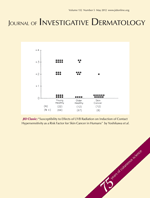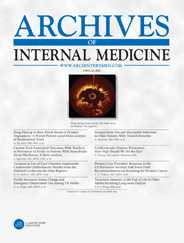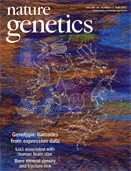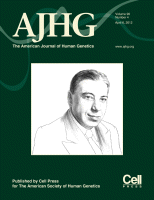J Invest Dermatol:牛皮癣导致心血管疾病风险增加的机理
2012-05-19 Beyond 生物谷
近日,凯斯西储研究者证实慢性皮肤炎症会促进动脉粥样硬化的发展。发现了牛皮癣导致心血管疾病风险增加的机理。 牛皮癣和心血管事件之间的联系已被研究多年,但其中确切机制一直不明确。凯斯西储大学医学院研究人员首次发现了炎症性皮肤病导致心血管疾病的临床证据。此外,该研究还表明,积极逆转牛皮能降低心血管疾病的危险。 相关研究论文发表在Journal of Investigative Dermatology
近日,凯斯西储研究者证实慢性皮肤炎症会促进动脉粥样硬化的发展。发现了牛皮癣导致心血管疾病风险增加的机理。
牛皮癣和心血管事件之间的联系已被研究多年,但其中确切机制一直不明确。凯斯西储大学医学院研究人员首次发现了炎症性皮肤病导致心血管疾病的临床证据。此外,该研究还表明,积极逆转牛皮能降低心血管疾病的危险。
相关研究论文发表在Journal of Investigative Dermatology杂志上,这项研究采用了一种创新性小鼠模型探讨了皮肤疾病和心血管疾病之间的因果关系。Ward博士和她的研究小组表明,小鼠皮肤中过度表达在一种Tie-2蛋白质,会出现类似人类银屑病的皮肤状况。利用这个动物模型,研究人员发现,持久性的慢性皮肤炎症可导致如主动脉、大动脉等炎症。
Wang博士说:我们认为身体大面积的慢性炎症,可能是皮肤病患者心血管并发症风险增加的原因,但是到现在为止,我们没有办法模拟这一过程并明确地证明这一点。
Ward博士和她的团队测量银屑病模型小鼠和正常小鼠中血液凝块的形成,结果发现患病小鼠血凝时间大大缩短。进一步研究发现,患皮肤疾病小鼠也表现出类似的动脉粥样硬化或斑块的血管壁炎症。
重要的是,该项研究为牛皮癣患者的治疗有非常大的积极意义,Ward博士的工作能够证明后逆转皮肤疾病,心血管炎症和血液凝块的形成就会减少。(生物谷:Bioon.com)

doi:10.1038/jid.2012.112
PMC:
PMID:
Chronic Skin-Specific Inflammation Promotes Vascular Inflammation and Thrombosis
Yunmei Wang, Huiyun Gao, Candace M Loyd, Wen Fu, Doina Diaconu, Shijian Liu, Kevin D Cooper, Thomas S McCormick, Daniel I Simon and Nicole L Ward
Patients with psoriasis have systemic and vascular inflammation and are at increased risk for myocardial infarction, stroke, and cardiovascular death. However, the underlying mechanism(s) mediating the link between psoriasis and vascular disease is incompletely defined. This study sought to determine whether chronic skin-specific inflammation has the capacity to promote vascular inflammation and thrombosis. Using the KC-Tie2 doxycycline-repressible (Dox-off) murine model of psoriasiform skin disease, spontaneous aortic root inflammation was observed in 33% of KC-Tie2 compared with 0% of control mice by 12 months of age (P=0.04) and was characterized by the accumulation of macrophages, T lymphocytes, and B lymphocytes, as well as by reduced collagen content and increased elastin breaks. Importantly, aortic inflammation was preceded by increases in serum tumor necrosis factor-α, IL-17A, vascular endothelial growth factor, IL-12, monocyte chemotactic protein-1, and S100A8/A9, as well as splenic and circulating CD11b+Ly-6Chi pro-inflammatory monocytes. Doxycycline treatment of old mice with severe skin disease eliminated skin inflammation and the presence of aortic root lesion in 1-year-old KC-Tie2 animals. Given the bidirectional link between inflammation and thrombosis, arterial thrombosis was assessed in KC-Tie2 and control mice; mean time to occlusive thrombus formation was shortened by 64% (P=0.002) in KC-Tie2 animals; and doxycycline treatment returned thrombosis clotting times to that of control mice (P=0.69). These findings demonstrate that sustained skin-specific inflammation promotes aortic root inflammation and thrombosis and suggest that aggressive treatment of skin inflammation may attenuate pro-inflammatory and pro-thrombotic pathways that produce cardiovascular disease in psoriasis patients.
本网站所有内容来源注明为“梅斯医学”或“MedSci原创”的文字、图片和音视频资料,版权均属于梅斯医学所有。非经授权,任何媒体、网站或个人不得转载,授权转载时须注明来源为“梅斯医学”。其它来源的文章系转载文章,或“梅斯号”自媒体发布的文章,仅系出于传递更多信息之目的,本站仅负责审核内容合规,其内容不代表本站立场,本站不负责内容的准确性和版权。如果存在侵权、或不希望被转载的媒体或个人可与我们联系,我们将立即进行删除处理。
在此留言














#EST#
112
#牛皮癣#
101
#疾病风险#
104
#血管疾病#
94